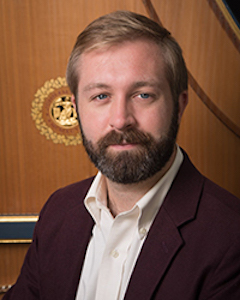
John McKean is a harpsichordist and musicologist based in Boston, where he serves on the faculty of the Longy School of Music. Frequently in demand as both a soloist and continuo player, he has performed extensively throughout Europe and North America, with concert engagements bringing him to venues as far afield as the Concertgebouw (Amsterdam), Fondazione Cini (Venice), Museu da Música (Lisbon), St. Martin-in-the-Fields (London), Norðurljós Hall (Reykjavík, Iceland), and the Philips Collection (Washington, DC). Critically acclaimed for his “intelligent” and “precise” playing (The Washington Post) as well as his “sonorous brilliance and thrilling, dance-like energy” (Allgäuer Zeitung), Dr. McKean performs with leading American and European ensembles, including Apollo’s Fire, Emmanuel Music, the Catacoustic Consort, Camerata Vocale Freiburg, Habsburger Camerata, and has appeared with the Jacksonville, Naples, Portland (Maine), and Pittsburg symphony orchestras (among others). He counts among his live radio broadcasts performances on NPR, BBC Radio 3, and Deutschlandradio Berlin.
Dr. McKean holds degrees in German Studies and Harpsichord Performance from Oberlin College/Conservatory and an advanced performance diploma from the Hochschule für Musik Freiburg (Germany), where his studied with Lisa Crawford/Webb Wiggins and Robert Hill respectively. He received additional instruction over the years from some of the greatest modern masters of historical keyboards, including Arthur Haas, Jacques Ogg, Skip Sempé, Jesper Christensen, Ketil Haugsand, Mitzi Meyerson, Richard Egarr, and Gustav Leonhardt. He also holds an M.Phil. and a Ph.D. in historical musicology from the University of Cambridge (U.K). His master’s thesis unearthed new details concerning the life and works of French harpsichord composer Gaspard Le Roux, while his doctoral dissertation examined the development of keyboard technique during the German Baroque. For several years he served as an assistant editor of the Oxford University Press journal Early Music. Beyond his musicological work and performing career, he also maintains an active interest in instrument building (he regularly performs on his own reconstruction of a 17th-century Flemish harpsichord), music publishing, typography, and exploring the remote corners of his home state of Maine.
Teaching Philosophy
The core of my teaching philosophy consists of a simple desire to impart to my students my own passion and enthusiasm for the material I research, teach, and perform; this, in my opinion, is the most effective way to foster the kind of curiosity and critical thinking that allows truly meaningful, life-long learning to take place. I strive to create a teaching environment that stimulates active student participation and encourages a free interchange of ideas. A key objective of my teaching is to motivate students to construct their own understanding of the subject matter we explore together. Beyond teaching the fundamentals of music history and musicological methods, I also strive to enrich my students’ perceptions of the interrelationship between theory and practice and the fascinating challenges involved with studying a subject as multifaceted and ephemeral as music. I encourage them to think, speak, and write about music history not merely as a timeline of facts and figures, but rather as a dynamic and ever-evolving constellation of aesthetic trends, cultural conventions, physical techniques of performance, and interpretive performance practices, all of which are in a constant state of flux. The vitality such an approach engenders equips students with a contextual awareness of history and historical practice that empowers them as critical thinkers, interpreters, researchers, and insightful members of the musical community at large.
